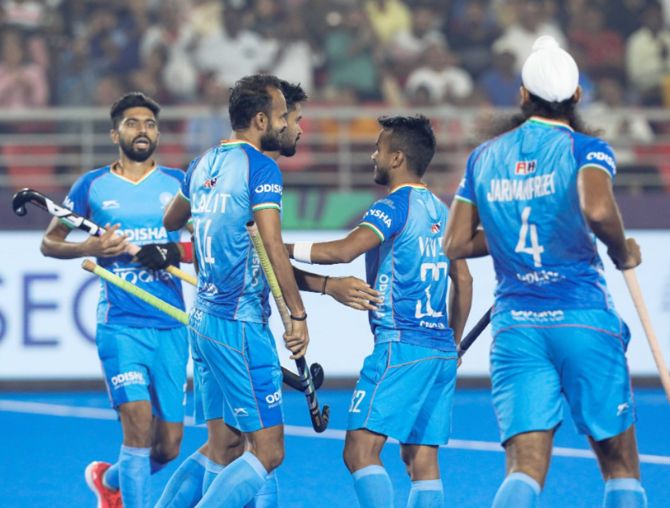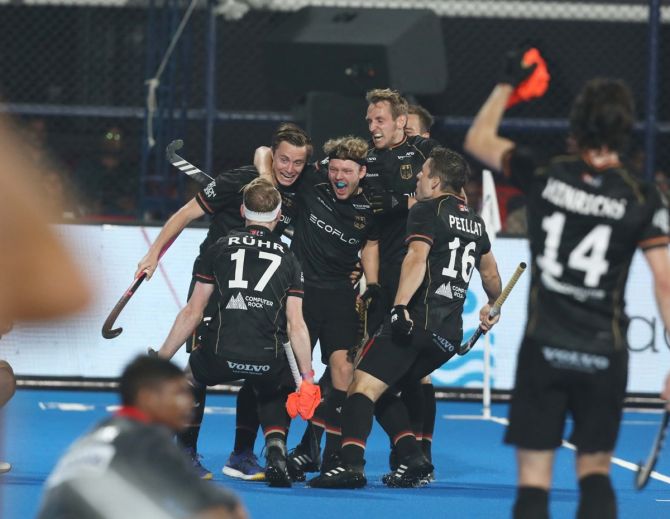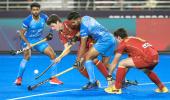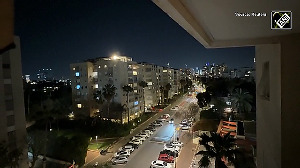German resilience triumphs in high-quality World Cup

In a World Cup of high-quality hockey, the German "culture of resilience" triumphed, ending Belgium's five-year reign as the most successful team, while hosts India's nearly five-decade long wait for a medal continued.
The Germans made another stunning comeback from a two-goal deficit to beat defending champions Belgium 5-4 in a penalty shootout of a classic summit clash. The two sides were locked 3-3 in the regulation time of 60 minutes on Sunday.
This was the third time in the showpiece that Germany had won after trailing 0-2 and their fabled mental strength and never-say-die attitude came to the fore again. They had done so against England in the quarterfinals and against Australia in the semifinals.
Germany joined Australia and Netherlands to have clinched the World Cup title three times. Only Pakistan have won the World Cup four times. Germany's earlier triumphs had come in 2002 and 2006. They were runners-up in 1982 and 2010 and finished sixth and fifth in the 2014 and 2018 editions respectively.
The triumph also took Germany to the top of FIH world rankings from the pre-tournament fourth place.
"This triumph is incredible, I don't have any words to describe this feat," German coach Andre Henning said after his side's first title win since 2006.
"We came back from 0-2 down in the quarterfinals, semifinals and now in the final. You cannot now say it is luck, it is due to the quality in this team. We had the belief throughout that we can win this World Cup."
Netherlands, who had finished runners-up in the last two editions, clinched their fourth straight medal after beating Australia 3-1 in the bronze play-off. They had also won a bronze in the 2010 edition.
For Australia, this was the first time they returned home without a medal after they finished fourth in the 1998 edition. They had won a bronze in the last edition.
German striker Niklas Wellen, who scored a last-minute goal against Australia in the semifinals and another one in the final, was fittingly named player of the tournament. He was also the joint third highest scorer with seven strikes, sharing the position with Netherlands captain Thierry Brinkman.
Australia's Jeremy Hayward emerged as the tournament's top scorer with nine goals in six matches while Tom Boon of Belgium, Victor Charlet of France and Jip Janssen of Netherlands were joint second with eight goals each.
Belgium had started their 'incredible journey' as the world's best side by winning the 2018 World Cup at the same Kalinga Stadium where they were beaten by the Germans on Sunday.
The Belgians had won the Tokyo Olympics title after that. Their coach Michel van den Heuvel had actually used this term 'German culture of resilience' in the pre-final press conference and had warned his players of the enormous mental strength of their opponents but, in the end, they could not find a way to deal with it.
"It is disappointing not to have won this World Cup. But we are proud of this group which has done incredibly well in the last few years," van den Heuvel said.
"Every opponent had been looking for an opportunity and ways to win against us in these years. Now, it is our turn to try and find an answer in the next one and half years," he added, indicating that they will bounce back in the 2024 Paris Olympics.
The next World Cup in 2026 will be co-hosted by Belgium and Netherlands and under tournament rules both the countries have already qualified for the showpiece.
Overall, it was a high-quality World Cup with no clear favourites. The four semifinalists and England, who lost to eventual champions Germany in a penalty shootout in the quarterfinals, could have beaten any side on their day.

For India, though, it was yet another disappointment in their second consecutive home World Cup as they made a shock exit before the quarterfinals stage.
If the Germans made it a habit of coming back from 0-2 down to win the World Cup, it was the opposite for India as the hosts, ranked sixth in the world, squandered a two-goal advantage to lose to New Zealand, six places below them in world rankings, in penalty shootout in their crossover match.
With crores of rupees being spent on training, exposure tours and support staff salaries, this team would have done better and at least reached the quarterfinals, if not the semifinals.
In the end, this was India's fifth worst placing in all the 15th editions of the World Cup the country has participated in. India had finished below ninth on four occasions -- in 1986 (12th), 1990 (10th), 2002 (10th) and 2006 (11th).
They had finished ninth in 1998 and 2014 also. India had crashed out in the quarterfinal in the home World Cup in 2018.
Two main reasons for India's debacle were the abysmal rate of penalty corner conversion and the lack of finishing by the forwards. To this should be added the inconsistency in defending.
India, whose last World Cup medal came in 1975 when they won a gold in Kuala Lumpur, did beat Spain (2-0) and drew goalless with England but could only win with 4-2 margin against minnows Wales that cost the home team a top place finish in their pool, which would have taken them directly to the quarterfinals.
Head coach Graham Reid later admitted that a home World Cup brought extra pressure to the players which was sometimes difficult to process, and stressed the need for the team to have a mental conditioning coach.
This World Cup, participated by 16 teams, turned out to be the highest scoring one in all of the 15th editions with an average of 5.66 goals per match. The tournament saw 249 goals being scored in 44 matches. 143 were field goals, while 94 and 12 came from penalty corners and penalty strokes, respectively.
The 2010 World Cup in New Delhi, which was participated by 12 teams, had 199 goals from 38 matches, at an average of 5.24 per game.
The penalty corner conversion rate, though, went down drastically, with most of the teams defending the PCs much better than earlier.
On the organisational front, Odisha rolled out the best ever facilities in a World Cup, with the 21,000 capacity Birsa Munda Stadium in Rourkela being added as co-host venue along with the Kalinga Stadium in Bhubaneswar.
The Birsa Munda Stadium was declared by the word governing body FIH as the largest all-seater hockey specific venue in the world.
The concept of World Cup Village was introduced for the first time as all the participating teams were housed in a five-star level accommodation run by the Taj Group inside the Birsa Munda Stadium complex.
"This is one of the best World Cups ever, one of the best events in global hockey. It was a great experience for the local population and for the participating teams and athletes," FIH chief Ikram Tayyab said.
Players and officials of participating teams were, however, more effusive than Tayyab in praise of the tournament organisers, saying that this World Cup has set a benchmark with the facilities it rolled out, which will be difficult to match in the future editions.












 © 2025
© 2025